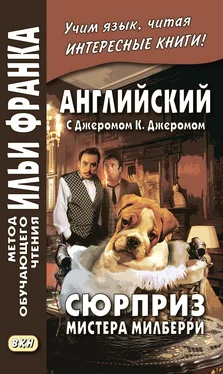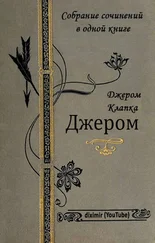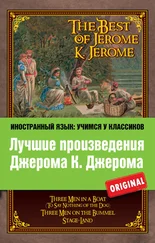could[kʋd] , relief[rɪ'li:f] , handkerchief['hæŋkǝʧɪf] , alarmed[ǝ'lɑ:md] , engaged[ɪn'ɡeɪʤd]
I followed him up into his room, and asked him if I could do anything for him. He flopped the hamper on the bed with a sigh of relief, took off his hat, wiped his head with his handkerchief, and then turned to answer me.
“Are you a married man?” says he.
It was an odd question to put to a waiter, but coming from a gent there was nothing to be alarmed about.
“Well, not exactly,” I says – I was only engaged at that time, and that not to my wife, if you understand what I mean – “but I know a good deal about it,” I says, “and if it's a matter of advice – ”
“It isn't that,” he answers, interrupting me(это не то = дело не в этом , – отвечает он, перебивая меня; to interrupt – прерывать, обрывать; перебивать /говорящего/ ) ; “but I don't want you to laugh at me(но я не хочу, чтобы вы смеялись надо мной) . I thought if you were a married man(я думал, если вы женатый человек) you would be able to understand the thing better(то могли бы лучше понять это дело) . Have you got an intelligent woman in the house(у вас есть в этом доме умная женщина; intelligent – умный, сообразительный, смышленый ) ?”
“We've got women(у нас есть женщины) ,” I says. “As to their intelligence, that's a matter of opinion(что касается их ума, это спорный вопрос: «дело мнения»; opinion – взгляд, мнение; оценка ) ; they're the average sort of women(они – средний тип женщин = обыкновенные женщины) . Shall I call the chambermaid(позвать горничную; to call – кричать; звать, вызывать; chamber – /уст./ комната /в жилом доме/; спальня; горница; maid – служанка, горничная ) ?”
“Ah, do(о, позовите) ,” he says. “Wait a minute,” he says(подождите минутку, – говорит он) ; “we'll open it first(сначала /мы/ откроем это; first – первый; сперва, сначала ) .”
He began to fumble with the cord(он начал возиться с веревкой; to fumble – неловко, неумело обращаться /с чем-л./; мять, вертеть в руках; cord – тонкая веревка, шнур ) , then he suddenly lets go and begins to chuckle to himself(потом вдруг выпускает ее /из рук/ и начинает посмеиваться /про себя/; suddenly – внезапно, вдруг, неожиданно; to chuckle – посмеиваться, хихикать ).
answers['ɑ:nsǝz] , laugh[lɑ:f] , average['æv(ǝ)rɪʤ] , minute['mɪnɪt]
“It isn't that,” he answers, interrupting me; “but I don't want you to laugh at me. I thought if you were a married man you would be able to understand the thing better. Have you got an intelligent woman in the house?”
“We've got women,” I says. “As to their intelligence, that's a matter of opinion; they're the average sort of women. Shall I call the chambermaid?”
“Ah, do,” he says. “Wait a minute,” he says; “we'll open it first.”
He began to fumble with the cord, then he suddenly lets go and begins to chuckle to himself.
“No,” he says, “you open it(нет, – говорит, – вы открывайте) . Open it carefully; it will surprise you(открывайте осторожно; это вас удивит; careful – заботливый, внимательный; осторожный; care – забота; внимание, осторожность ) .”
I don't take much stock in surprises myself(сам я не очень-то доверяю сюрпризам; to take stock in smth. – /разг./ верить во что-л.; придавать значение чему-л.; stock – запас; репутация, имя; /разг./ доверие, вера ) . My experience is that they're mostly unpleasant(мой /жизненный/ опыт говорит, что они главным образом неприятные; mostly – главным образом; большей частью, обычно; pleasant – приятный; милый, славный ).
“What's in it?” I says(что в ней? – спрашиваю).
“You'll see if you open it(увидите, если откроете ее) ,” he says: “it won't hurt you(это вам /никак/ не повредит; won't = will not; to hurt – причинять боль, вред, ущерб ) .” And off he goes again, chuckling to himself(и отходит снова, посмеиваясь; to go off – уходить, уезжать ).
“Well,” I says to myself(ну, – говорю я себе/думаю про себя) , “I hope you're a harmless specimen(надеюсь, вы безобидный субъект; specimen – образец; экземпляр; /разг., ирон./ тип, субъект ) .” Then an idea struck me(тут одна мысль пришла мне в голову; idea – идея, мысль; to strike – ударять, бить; поражать; приходить в голову ) , and I stopped with the knot in my fingers(и я остановился с узлом в пальцах).
“It ain't a corpse,” I says, “is it(это не труп, не так ли; ain't = /прост., разг./ am not, is not, are not, have not или has not ) ?”
carefully ['keǝf(ǝ)lɪ] , experience [ɪk'spɪ(ǝ)rɪǝns] , unpleasant [ʌn'plez(ǝ)nt] , hurt [hɜ:t] , specimen ['spesɪmǝn] , knot [nɒt] , corpse [kɔ:ps]
“No,” he says, “you open it. Open it carefully; it will surprise you.”
I don't take much stock in surprises myself. My experience is that they're mostly unpleasant.
“What's in it?” I says.
“You'll see if you open it,” he says: “it won't hurt you.” And off he goes again, chuckling to himself.
“Well,” I says to myself, “I hope you're a harmless specimen.” Then an idea struck me, and I stopped with the knot in my fingers.
“It ain't a corpse,” I says, “is it?”
He turned as white as the sheet on the bed(он повернулся, бледный как полотно, на кровати; white – белый; бледный; sheet – простыня; полотно, холст ) , and clutched the mantelpiece(и вцепился в каминную полку; to clutch – схватить/ся/, стиснуть; mantelpiece – каминная доска; каминная полка; piece – кусок; часть ) . “Good God! don't suggest such a thing(боже мой! не говорите такого; good God! – боже мой! боже милостивый!; вот те на! /выражает удивление, досаду, гнев и т. д./; to suggest – предлагать, советовать; выдвигать предположение; намекать, наводить /на мысль/ ) ,” he says; “I never thought of that(я и не думал об этом; never – никогда; ни разу; /эмоц. – усил./ нисколько, никоим образом ) . Open it quickly(откройте ее скорее; quickly – быстро, скоро; quick – быстрый, скорый ) .”
Читать дальше











